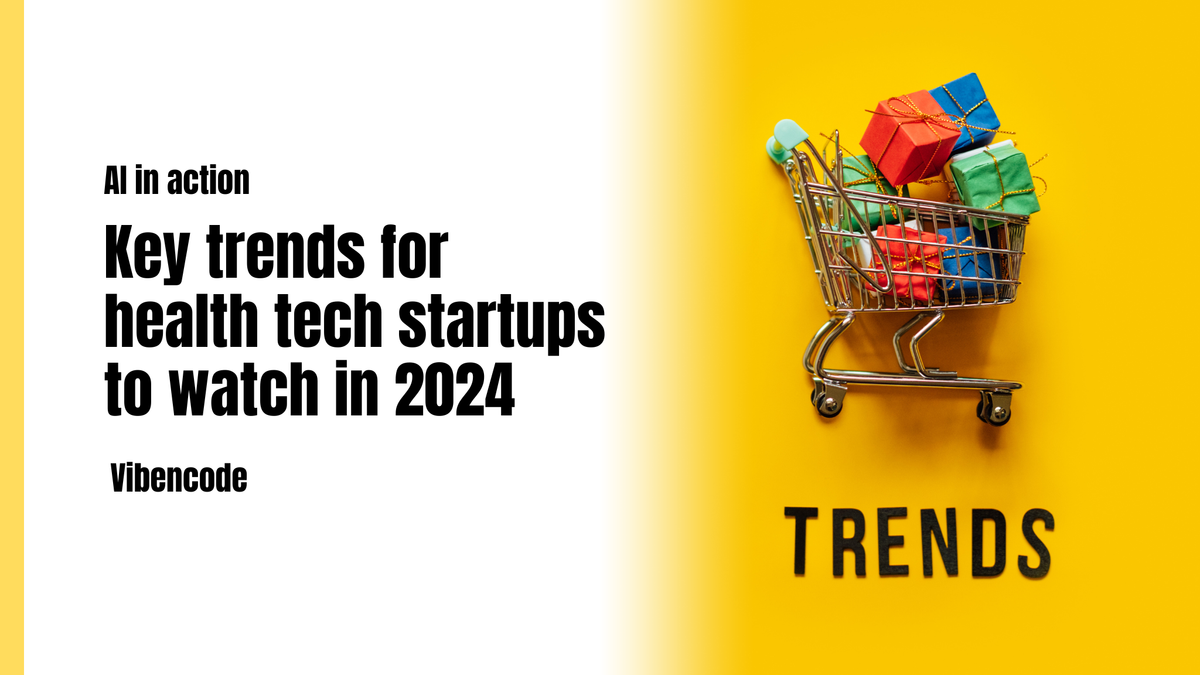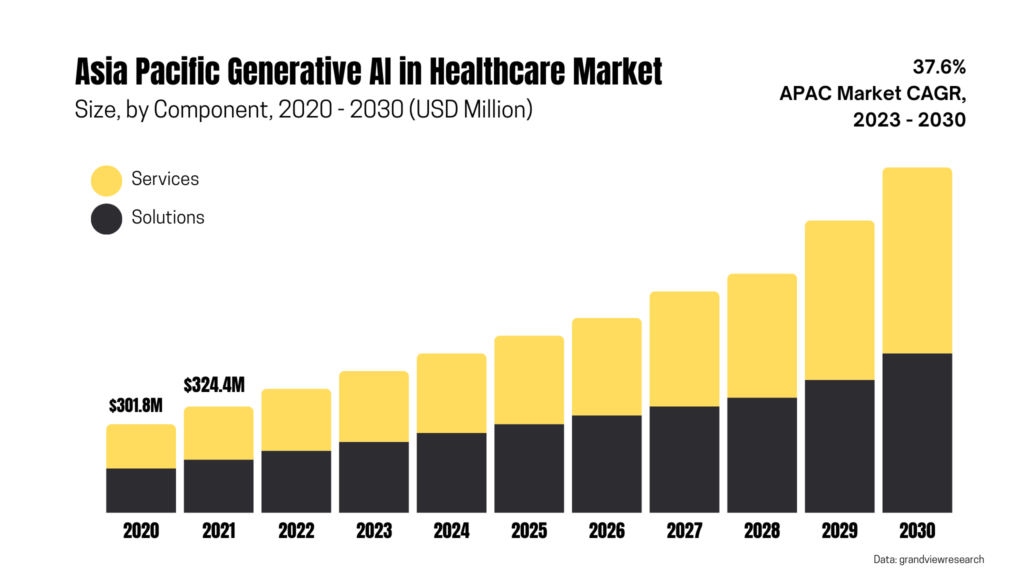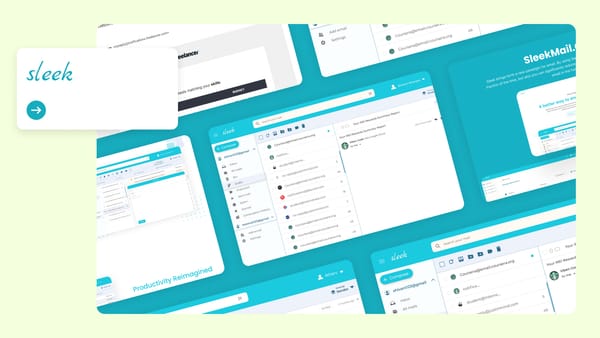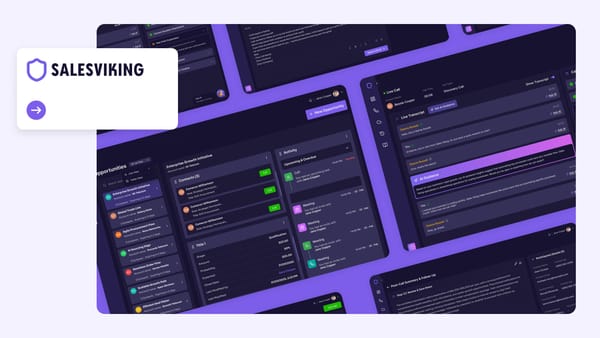Key trends for health tech startups to watch in 2024

The Rise of Generative AI
The health tech startups scene are booming with innovation. This brings both challenges and opportunities for new business owners. As 2024 unfolds, several key trends are emerging. They are driven by the rise of generative AI and other tech advances. Exploring these trends will help navigate this dynamic field. This article will examine 2024 health tech startup trends. We’ll see what they mean for entrepreneurs.
Generative AI in Health Tech Startups
Generative AI is transforming health tech. It drives advanced solutions for healthcare professionals and patients.
By 2030, the generative AI in the healthcare market will be $17.3 billion. It will grow at a CAGR of 34.2% from 2023 to 2030 (source: Grand View Research). This tech enables innovations in drug discovery, personalized medicine, and diagnostics. It leads to faster development and better patient outcomes.

Drug Discovery and Development
The traditional drug discovery process is slow and costly. It often takes over a decade and costs over $2.6 billion.
Generative AI speeds this up. It simulates drug compounds and predicts their interactions with biological targets. Startups like Insilico Medicine and Atomwise are using AI to find drug candidates. They do it in a fraction of the usual time.
In 2023, Insilico Medicine announced a new drug candidate for idiopathic pulmonary fibrosis. It reached the human trial phase in just 30 months, far faster than the 5-7 year industry average.
Personalized Medicine
Generative AI can create personalized medicine. It does this by analyzing vast datasets. It finds the best treatment plans for individuals. Health tech startups are making platforms that use AI. They evaluate patient data, genetic info, and lifestyle choices to tailor treatment plans. This individualized approach not only improves patient outcomes but also reduces healthcare costs.
Diagnostic Tools
Diagnostic accuracy is crucial in healthcare. Generative AI has great potential to transform this area. AI diagnostic tools analyze medical images and patient data. They provide fast, accurate diagnoses. Companies like Zebra Medical Vision are pioneers in this field. They use AI to help healthcare professionals. It improves diagnosis speed and accuracy.
The Proliferation of Telehealth Services
Telehealth became vital during the COVID-19 pandemic. It is now gaining traction. Health tech startups are changing how patients and providers interact. They are making healthcare more accessible and efficient.
Virtual Consultations
Demand for virtual consultations is soaring. Patients and doctors are using telehealth for check-ups, chronic disease management, and mental health care. Startups like Teladoc Health are leading the charge, providing comprehensive, multi-specialty telehealth solutions.
Remote Monitoring
Remote monitoring technologies are a game-changer for chronic disease management and post-operative care. Health tech startups are making wearables and sensors. They collect patient data in real time. This allows for monitoring and quick interventions. Companies like Biofourmis use predictive analytics. It helps prevent health issues and avoid hospital readmissions. They are the leaders in this field. Their platforms can foresee potential complications.
Integration with Electronic Health Records (EHRs)
Telehealth platforms must integrate with EHRs for cohesive patient care. Startups are focusing on interoperable solutions to share patient data across healthcare systems. This will enhance the quality and continuity of care. Virta Health shows the promise of integrated telehealth for better patient care.
Advanced Wearable Health Devices
Wearable health devices have evolved beyond simple fitness trackers. Today’s advanced wearables offer comprehensive health monitoring, providing patients and healthcare providers with valuable insights into health trends and potential issues.
Continuous Health Monitoring
Advanced wearables are equipped with sensors that monitor a range of health metrics, including heart rate, blood pressure, glucose levels, and even sleep patterns. These devices enable continuous health monitoring, allowing for early detection of potential health issues and prompt intervention. Startups like Oura Health are setting the standard with their smart rings that provide holistic health monitoring capabilities.
Data-Driven Insights
AI and machine learning analyze the data from wearable devices. They provide actionable insights. Health tech startups are developing platforms that turn raw data into health insights. This empowers users to make informed health decisions.
Fitbit (now part of Google) and others keep innovating. They make data-driven health trackers for a variety of health needs.
Integration with Healthcare Systems
Seamless integration of wearable devices with healthcare systems is crucial for maximal impact. Health tech startups are making interoperable wearables. They should share data with EHRs, telehealth platforms, and other healthcare systems. Innovations from startups like Withings are enabling wearables to play a key role in patient care.
Mental Health Tech Solutions
Mental health remains a critical focus area, with startups developing tech solutions to address the growing mental health challenges. Innovative health tech startups are creating platforms and tools to enhance mental health care delivery.
AI-Driven Therapy
AI-driven therapy platforms offer personalized mental health support. They use CBT, mindfulness, and relaxation techniques. Health tech startups are using AI to create affordable, accessible mental health solutions. They aim to meet diverse needs. Woebot Health is a pioneer in this area. They offer AI chatbots that provide 24/7 mental health support.
Teletherapy Services
Teletherapy services have soared in popularity, providing convenient access to mental health professionals. Health tech startups are developing teletherapy platforms that offer video consultations, secure messaging, and digital therapeutic tools. Startups like Talkspace are transforming mental health care by providing flexible, remote access to licensed therapists.
Wellness Applications
Wellness apps aim to improve mental health. They use techniques like meditation, stress management, and emotional tracking. Health tech startups are making innovative apps that fit into users’ daily routines. Companies like Calm and Headspace lead the wellness app market. They offer holistic solutions to boost mental well-being.
The Role of Big Data and Analytics
Big data and analytics are transforming healthcare. They provide insights into patient health and efficiency. Health tech startups are using big data to innovate and improve health outcomes.
- Predictive Analytics
Predictive analytics in healthcare can anticipate health events and enable early interventions. Health tech startups are developing models that analyze patient data. They aim to forecast health issues and recommend preventive measures. Companies like Health Catalyst are improving predictive analytics. Their solutions promote proactive healthcare.
- Operational Efficiency
Big data analytics can boost efficiency in healthcare. It reduces costs and improves patient care. Health tech startups are creating tools to analyze data. These tools streamline processes, optimize resources, and enhance patient experiences. Startups like LeanTaaS are leading the charge. They offer solutions that maximize efficiency in hospitals and clinics.
- Population Health Management
Managing population health requires a thorough data analysis. It helps to spot trends and to implement effective interventions. Health tech startups are using big data for this. They aim to develop tools to manage population health. These tools will monitor public health trends, manage chronic conditions, and inform health policies. Companies like Carrot Health are at the forefront. They use big data to improve population health strategies.
Regulatory Compliance and Data Privacy
Regulatory compliance and data privacy remain top priorities for health tech startups. It’s vital to navigate the complex regulations and protect data privacy. This is key to the success of health tech innovations.
Compliance with Health Regulations
Health tech startups must follow various regulations to protect patient data. In the US, they must comply with HIPAA. In Europe, they must follow GDPR. Startups are developing health tech solutions that meet regulations. They aim to be both compliant and innovative. Companies like MedStack provide compliant infrastructure solutions. They enable startups to meet regulatory standards, seamlessly.
Data Privacy Solutions
To protect data, startups are implementing advanced security measures. These include strong encryption and anonymization. They safeguard patient information and build trust with patients. They also help comply with complex rules like HIPAA and GDPR. Using cutting-edge data privacy solutions lets them deliver innovative health tech services.
As regulations tighten, data privacy is under more scrutiny. Startups are using blockchain to improve data integrity and transparency. This gives patients more control over their health data. It is reshaping how health information is managed and shared. We must protect patient privacy. At the same time, we must allow access to vital health services.
Risk Management
In health tech, effective risk management is vital. It protects against data breaches and compliance failures. Startups are using proactive risk management strategies. They include continuous monitoring, threat detection, and response protocols. They can use advanced analytics and machine learning. They can quickly find system vulnerabilities and respond to reduce risks.
Also, AI-driven risk management tools are now vital. They streamline threat detection and boost the security of health tech platforms. Startups must manage risks. This protects their solutions, ensures compliance, and builds patient trust. As cyber threats evolve, health tech innovators need a strong risk management framework.
Consumer-Centric Health Tech
Consumer-centric health tech is revolutionizing healthcare. It focuses on patients’ needs and preferences. Startups in this sector are using new technologies. They aim to boost patient engagement and satisfaction. Their goal is to create personalized, convenient healthcare that meets individual expectations.
Personalized Health Solutions
Personalized health solutions use data to tailor interventions to individual needs. Health tech startups analyze patient data, from medical history to lifestyle choices. They then provide customized recommendations for fitness, nutrition, and medication. Wearable tech and mobile apps let patients track progress and get real-time feedback. This fosters a proactive approach to health management. These platforms empower users and enable providers to deliver targeted care. This leads to better health outcomes and higher patient satisfaction.
On-Demand Healthcare Services
On-demand healthcare services are changing how patients access care. They enable timely interventions and enhance convenience. Startups are making platforms for patients to consult healthcare professionals. They can do this via telehealth or in-home visits, at their convenience. On-demand services help connect patients and providers, especially in remote areas. These platforms improve patient experiences by streamlining access to prescriptions and healthcare. They also make the system more efficient.
Enhanced Patient Engagement
Enhanced patient engagement is pivotal in driving positive health outcomes. Health tech startups are creating interactive platforms. They aim to engage patients in managing their healthcare. These startups use gamification, educational resources, and digital tools. They aim to make patients feel ownership of their health journeys. Engaged patients are more likely to follow treatment plans. They also communicate better with their providers. As a result, they achieve better health. The focus on patient empowerment shows a shift in healthcare. It now views patients as partners, not just passive recipients.
Conclusion
In 2024, health tech startups are transforming healthcare. They are using generative AI, telehealth, and wearable devices. They also use blockchain, mental health tech, big data, and regulatory compliance. Their focus is on consumer-centric solutions.
As a generative AI service provider, VIBENCODE is helping drive these innovations. New business owners must know these trends. They must navigate the fast-changing health tech landscape. Doing so will help them seize opportunities and contribute to healthcare’s evolution.





